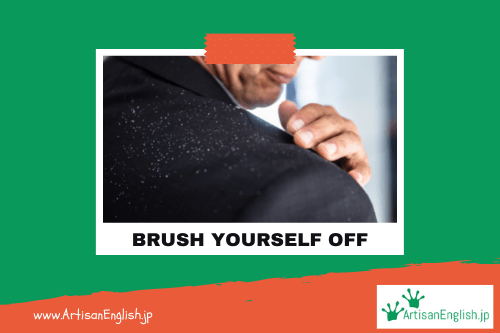
YouTube / iTunes / Spotify / Radio Public / Pocket Casts / Google Podcasts / Breaker / Overcast
Listen to ArtisanEnglish.jp posts & lesson intros here.
WotD: Brush yourself off
Today’s post is about brushing yourself off.
Before we get into it, you must understand there is a massive difference between giving someone the brush-off and brushing yourself off.
Language is tricky, English, especially so.
We have all fallen down.
After falling down, it’s important to get back up and brush yourself off or remove the dust from your clothes.
I suggest you click the hyperlink and refresh your memory if you’re not clear about giving someone the brush-off.
OK, here we go.
A lot of people these days have sedentary jobs.
That, however, doesn’t mean they have to lead sedentary lifestyles.
To be in the best of health, it’s essential to get off your A**, get out there and move.
Sitting in a chair in front of a computer is a pretty safe place to be.
It’s a fact of life that the more you go outside and move, the better the chances are that you will eventually fall down.
Yes, I know it’s redundant. Nobody ever ‘falls up.’
Native English speakers commonly say ‘fall down,’ and who am I to argue with the convention?
I’ll leave it as it is, thank you very much.
When you fall down, it’s essential to immediately get back up, brush yourself off and get back in the saddle again.
The Brits like to say ‘dust yourself off,’ but it’s the same thing, tomato, tomato, right?
Anyways, brushing yourself off means removing the dirt from your clothing.
When you fall down, there’s a good chance you’re going to become dirty.
That’s why you should never wear white when going hiking, biking or doing any sport where you may get dirt on your clothing.
If you wear white and come home looking dirty and dishevelled, your better half will surely give you the brush-off.
We don’t want that, do we?
Flesch-Kincaid Readability Test
This post is understandable by someone with at least a 7th-grade education (age 12).
On the Flesch-Kincaid reading-ease test, this post scores 77.
The easier a passage is to read, the higher the score on a scale of 0 – 100.

